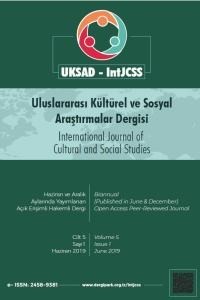The Importance, Contribution and Problems of Parents with Phenylketonuria (PKU) - An Association in İstanbul
Phenylketonuria, PKU, rare disorder family, nutrition,
___
- Amber, E. et al. (2010). High Phenylalanine Levels Directly Affect Mood and Sustained Attention in Adults with Phenylketonuria: A randomized, doube- blind, placebo- controlled, crossover trial.
- Ana Çocuk Sağlığı Aile Planlaması Genel Müdürlüğü. (2016, Aralık 23). Neonatal Tarama Programı Genelgesi 2006/ 130. Retrieved from T.C. Sağlık Bakanlığı Web Sitesi: http://www.saglik.gov.tr/TR,11079/neonatal-tarama-programi-genelgesi-2006--130.html
- Arslan, K. (2010). Batı Karadeniz Bölgesindeki Akraba Evliliklerinde Kronik Ve Genetik Hastalıklar Sıklığının Araştırılması. DÜZCE ÜNİVERSİTESİ Sağlık Bilimleri Enstitüsü Yüksek Lisans Tezi.
- Bernstein, L., & ark. (2013). Nutrition education tools used in phenylketonuria: clinician, parent and patient perspectives from three international surveys . Journal of Human Nutrition and Dietetics.
- Bik, M., & ark. (2009). Quality of life in noncompliant adults with phenylketonuria after resumption of the diet. Journal of Inherited Metabolic Diseases.
- Blau, N., & ark. (2010). Phenylketonuria.
- Blau, N., J van Spronsen, F., & Lavy, H. (2010, October 23). Phenylketonuria. The Lancet, pp. 1417-1427.
- Burgut, Ö. (2014). Disease Perception Among Mothers of Children with PKU.
- Diesen, P., & Counsel, G. (2016). “I Feel Lucky”- Gratitude Among Young Adults with Phenylketonuria (PKU). Journal of Genetic Counseling.
- Groselja, U., Tanseka, M., & Battelin, T. (2014). Fifty years of phenylketonuria newborn screening — A great success for many, but what about the rest? Molecular Genetics and Metabolism, 113-1/2.
- Köksal, G., & Gökmen, H. (2015). Çocuk Hastalıklarında Beslenme Tedavisi, Fenilketonüri. Ankara: Hatiboğlu Yayınları. Retrieved Ekim Cuma, 2016
- Neonatal Tarama Programı Genelgesi 2006 / 130. (2017, April 19). Retrieved from www.saglik.gov.tr: https://www.saglik.gov.tr/TR,11079/neonatal-tarama-programi-genelgesi-2006--130.html
- Ozalp, I., & ark. (2001). Newborn PKU screening in Turkey: At present and organization for future.
- Scriver, C. (1995). Whatever happened to PKU? Clinical Biochemistry.
- Tabak, A. (2008). Endokrinoloji ve Metabolizma Polikliniğimizden Takipli Hastalarda Akraba Evliliği Sıklığı ve Akraba Evliliğini Etkileyen Faktörler.
- Web- 1. (2016, Kasım 3). Retrieved from National PKU Alliance Web sitesi: npku.org/Education/About-PKU, About PKU.
- Williams, R., Mamotte , C., & Burnett , J. (2008). Phenylketonuria: An Inborn Error of Phenylalanine Metabolism. Clinical Biochemistry Reviews, 29-1.
- Başlangıç: 2015
- Yayıncı: Mutlu TÜRKMEN
Müziğin İnsan Beyni Üzerindeki Etkisi
Dil Öğretiminde Sosyal Değerlerin Aktarımı
Yeni Medya Kavramının Ekonomi Politik Açıdan İncelenmesi
Denizli İli Atletizm Hakemlerinin Hakemlikte Kalma ve Bırakma Davranışlarının İncelenmesi
Bülent AĞBUĞA, Fikri GÜL, Fatma AĞBUĞA, Bülent ŞENKİBAR
Sporcu Eğitim Merkezlerinde Yatılı Olarak Eğitim Gören Sporcuların Ahlaki Karar Alma Tutumları
Emine KARPUZ, Hatice HARMANKAYA
Van Gölü’nün Rekreasyonel Turizm Potansiyelinin SWOT Analizi İle Değerlendirilmesi
